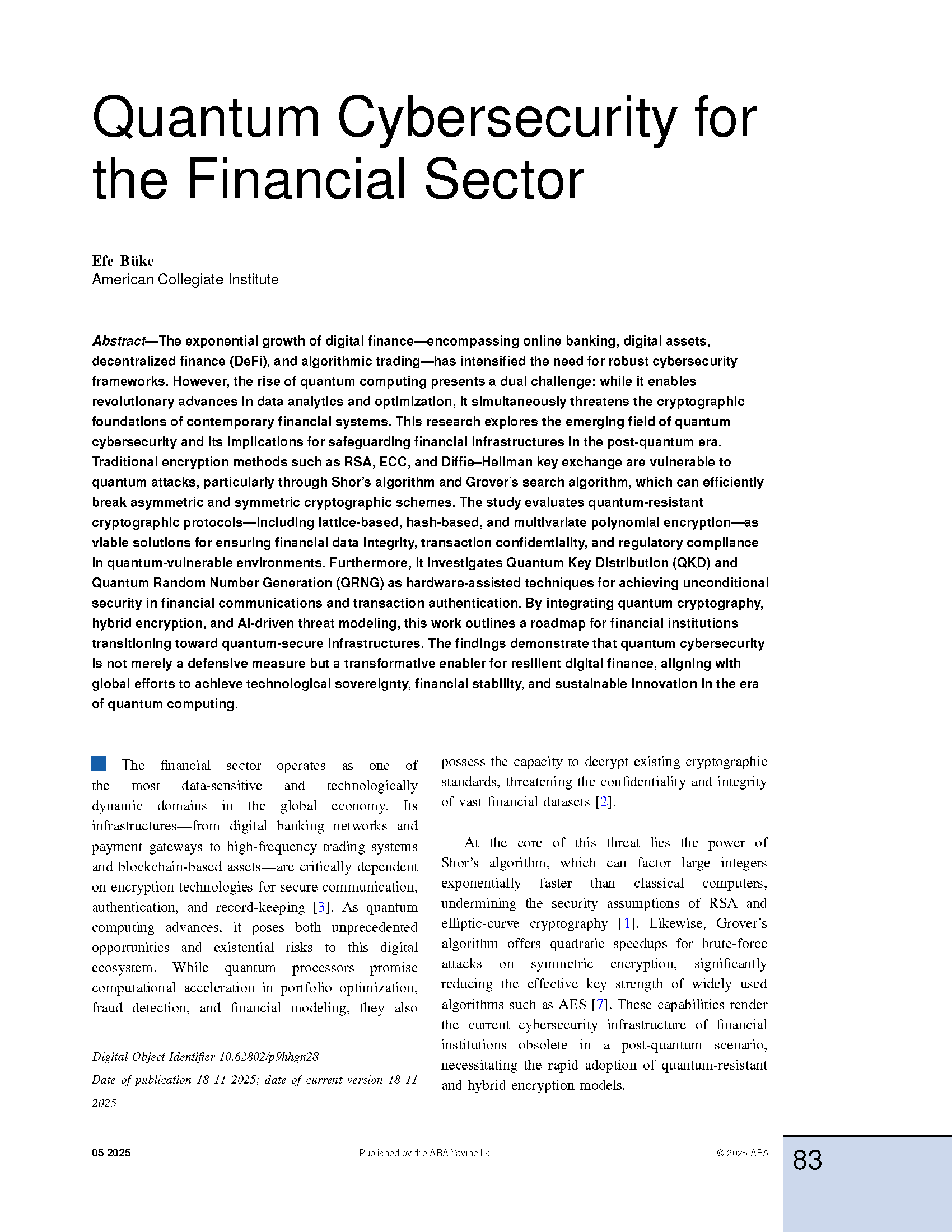Quantum Cybersecurity for the Financial Sector
DOI:
https://doi.org/10.62802/p9hhgn28Keywords:
quantum cybersecurity, post-quantum cryptography, financial systems, blockchain security, quantum key distribution, digital finance, quantum threats, financial data integrityAbstract
The exponential growth of digital finance—encompassing online banking, digital assets, decentralized finance (DeFi), and algorithmic trading—has intensified the need for robust cybersecurity frameworks. However, the rise of quantum computing presents a dual challenge: while it enables revolutionary advances in data analytics and optimization, it simultaneously threatens the cryptographic foundations of contemporary financial systems. This research explores the emerging field of quantum cybersecurity and its implications for safeguarding financial infrastructures in the post-quantum era. Traditional encryption methods such as RSA, ECC, and Diffie–Hellman key exchange are vulnerable to quantum attacks, particularly through Shor’s algorithm and Grover’s search algorithm, which can efficiently break asymmetric and symmetric cryptographic schemes. The study evaluates quantum-resistant cryptographic protocols—including lattice-based, hash-based, and multivariate polynomial encryption—as viable solutions for ensuring financial data integrity, transaction confidentiality, and regulatory compliance in quantum-vulnerable environments. Furthermore, it investigates Quantum Key Distribution (QKD) and Quantum Random Number Generation (QRNG) as hardware-assisted techniques for achieving unconditional security in financial communications and transaction authentication. By integrating quantum cryptography, hybrid encryption, and AI-driven threat modeling, this work outlines a roadmap for financial institutions transitioning toward quantum-secure infrastructures. The findings demonstrate that quantum cybersecurity is not merely a defensive measure but a transformative enabler for resilient digital finance, aligning with global efforts to achieve technological sovereignty, financial stability, and sustainable innovation in the era of quantum computing.
References
Akande, B. (2025). The Impact of Quantum Computing on Encryption: How Quantum Computers Can Break Current Encryption Methods, Such as RSA and ECC, and What This Means for Data Security.
Gbadebo, M. O. (2025). Integrating Post-Quantum Cryptography and Advanced Encryption Standards to Safeguard Sensitive Financial Records from Emerging Cyber Threats. Available at SSRN 5168159.
Khang, A. (Ed.). (2025). Shaping cutting-edge technologies and applications for digital banking and financial services. Productivity Press.
Marchsreiter, D. (2025). Towards quantum‐safe blockchain: Exploration of PQC and public‐key recovery on embedded systems. IET Blockchain, 5(1), e12094.
Nguyen, H., Huda, S., Nogami, Y., & Nguyen, T. T. (2025). Security in post-quantum era: A comprehensive survey on lattice-based algorithms. IEEE Access.
Sankalp, M. R., Lokapal, G., Mohan, B. A., & Basavaraj, G. N. (2025, March). Addressing Cybersecurity Challenges in 6G Networks Through AI-Driven Adaptive Defense Mechanisms and Quantum-Resilient Protocols. In 2025 International Conference on Computing for Sustainability and Intelligent Future (COMP-SIF) (pp. 1-12). IEEE.
Talman, A. (2025). Exploring Grover’s Algorithm in brute force attacks (Master's thesis, A. Talman).
Zafar, A. (2025). Quantum computing in finance: Regulatory readiness, legal gaps, and the future of secure tech innovation. European Journal of Risk Regulation, 1-32.


